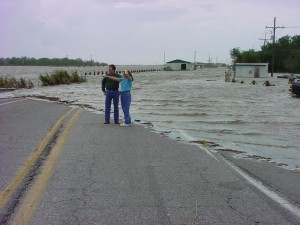Sea Level Rise And Extreme Weather Are 'Happening Faster Than We Thought,' Says Energy Sec. Chu
 Energy Secretary Steven Chu said Wednesday that scientific evidence of climate change is getting more and more powerful, comments that come as global warming legislation remains moribund in Congress and Environmental Protection regulations are facing ongoing GOP assaults. [The Hill]
Energy Secretary Steven Chu said Wednesday that scientific evidence of climate change is getting more and more powerful, comments that come as global warming legislation remains moribund in Congress and Environmental Protection regulations are facing ongoing GOP assaults. [The Hill]Oyster hatcheries along the Washington and Oregon coastlines began experiencing calamitous die-offs beginning in 2006. Scientists suspected they were due to increased carbon dioxide levels in the air that were causing ocean acidification. That theory has now proved out, according to a study just published by the journal Limnology and Oceanography. [New York Times]
A one-by-10-mile oil sheen has appeared in the Gulf of Mexico, and Shell Oil, one of several companies operating in the area, said it has “activated” a vessel with skimming and boom capabilities. [Washington Post]
Canadian provinces and territories are “all over the map” in terms of climate change plans, with Ontario, Quebec and B.C., leading the way while Alberta and Saskatchewan are lagging, says a report card released Wednesday by the David Suzuki Foundation. [Vancouver Sun]
Connecticut’s public works regulator plans to distribute $720 million to zero-emissions, renewable-energy generation and $300 million to low-emissions generation over the next several years, detailing for the first time how the state will spend more than $1 billion of required investments in commercially generated renewable power.[CT Post]
Global investment in clean energy dropped to its lowest since the depths of the financial crisis three years ago as the U.S. and European nations cut support for wind and solar projects, Bloomberg New Energy Finance said. [Bloomberg]
From the poorest parts of Africa and Asia to the most- developed regions in the U.S. and Europe, solar units, small-scale wind and biomass generators promise to extend access to power to more people than ever before. In the developing world, they’re slashing costs in the process. [Bloomberg]
The Jamaican government has established an advisory committee — manned by some of the island’s brightest scientific minds — as it moves to have the long-awaited Climate Change Department up and running by year-end. [Jamaica Observer]
Though the geothermal industry faces many hurdles including uncertain federal policies and lengthy project timelines, the Geothermal Energy Association announced last week that it added 91 MW of newly installed U.S. capacity in the past year. With this addition, the U.S. now has a total of 3,177 MW of capacity, which far outpaces the rest of the world. [Renewable Energy World]
GE led companies securing U.S. patents for clean energy technologies in 2011, with 184, pushing last year’s top company GM down to second place with 127, according to a report from the cleantech group of Heslin Rothenberg Farley & Mesiti P.C
You can return to the main Market News page, or press the Back button on your browser.

